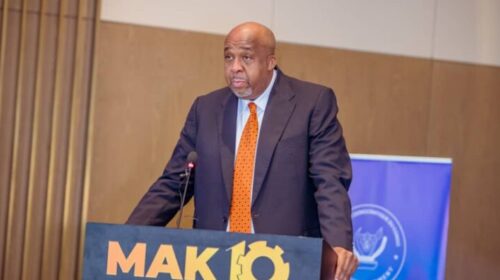Intergovernmental Forum calls for resource taxation re-evaluation
The Intergovernmental Forum on Mining, Minerals, Metals and Sustainable Development (IGF) has launched the Future of Resource Taxation, a new initiative aiming to improve the way governments collect revenue from the mining sector, specifically in developing countries needing to rebuild public finances in the wake of covid-19.
“The goal is to re-evaluate and improve the fiscal regimes governing the mining industry, which tend to be complex and difficult for governments to administer, especially in developing countries,” says Alexandra Readhead, IGF’s Lead for Tax and Extractives.
Almost half of the senior decision-maker respondents in a recent White & Case survey see increased taxation as the way resource nationalism is most likely to manifest itself in the wake of covid-19.
TAX AVOIDANCE PRACTICES SUCH AS TRANSFER MISPRICING, DISTORTED MINERAL VALUATIONS, EXCESSIVE INTEREST DEDUCTIONS, AND TREATY SHOPPING HAVE PITTED GOVERNMENTS AGAINST COMPANIES
Chinese legislators approved a new law in August last year that will give local governments the authority to tax as many as 164 different resources, including fossil fuels, minerals and eventually water, the Ministry of Finance said at the time. The law is set to go into effect in September 2020, the ministry said.
The International Monetary Fund estimates tax base erosion and profit shifting (BEPS) redirects more than $200 billion away from governments in the developing world annually.
Recent OECD data from 93 jurisdictions confirm that multinationals continue to lower their tax payments by using low-tax investment hubs where they report a relatively high share of their profits (25%) compared to their employees (4%) and tangible assets (11%), the Financial Times reported.
In the mining sector, aggressive tax avoidance practices such as transfer mispricing, distorted mineral valuations, excessive interest deductions, and treaty shopping have pitted governments against companies in often public clashes that harm the reputations of all stakeholders, IGF says.
“In recent years, we have seen mining tax conflicts from Australia to Zambia,” says Logan Wort, Executive Secretary of the African Tax Administration Forum (ATAF). “With governments looking to rebuild public finances post-covid-19, ensuring that mining contributes its fair share will be crucial for many countries,” says Wort.
While emerging technologies can promote greener and safer operations, they also threaten to disrupt the distribution of economic benefits from the industry, the IGF asserts.
Automation will mean fewer jobs and lower government tax receipts from employees. As such, governments will look to tax reform to make up revenue shortfalls.
The Future of Resource Taxation
The Future of Resource Taxation is a new initiative aiming to improve the way governments collect revenue from the mining sector, specifically in developing countries needing to rebuild public finances in the wake of COVID-19.
“The goal is to re-evaluate and improve the fiscal regimes governing the mining industry, which tend to be complex and difficult for governments to administer, especially in developing countries,” says Alexandra Readhead, Lead for Tax and Extractives with the Intergovernmental Forum on Mining, Minerals, Metals and Sustainable Development (IGF).
The International Monetary Fund estimates tax base erosion and profit shifting (BEPS) redirects more than USD 200 billion away from governments in the developing world annually.
In the mining sector, aggressive tax avoidance practices such as transfer mispricing, distorted mineral valuations, excessive interest deductions, and treaty shopping have pitted governments against companies in often public clashes that harm the reputations of all stakeholders.
“In recent years, we have seen mining tax conflicts from Australia to Zambia,” says Logan Wort, Executive Secretary of the African Tax Administration Forum (ATAF). “With governments looking to rebuild public finances post-COVID-19, ensuring that mining contributes its fair share will be crucial for many countries,” says Wort.
While emerging technologies can promote greener and safer operations, they also threaten to disrupt the distribution of economic benefits from the industry. For instance, automation will mean fewer jobs and lower government tax receipts from employees. As such, governments will look to tax reform to make up revenue shortfalls.
With a combined 87 member countries, IGF and ATAF are leading The Future of Resource Taxation and will leverage their complementary expertise and reach to research the existing problems, examine solutions, and then recommend the next generation of mining fiscal measures to policy-makers in countries seeking to maximize the benefits from their mineral wealth.
About The Future of Resource Taxation Project
Driven by research, The Future of Resource Taxation project will deliver timely recommendations for the next generation of mining fiscal policies that will allow for the equitable sharing of mining’s benefits and engender trust between industry, governments, and civil society. The project is a partnership with IGF and ATAF, in concert with the Inter-American Center of Tax Administrations (CIAT). The Future of Resource Taxation is funded by the Ford Foundation.
About IGF
The IGF supports more than 75 nations committed to leveraging mining for sustainable development to ensure negative impacts are limited and financial benefits are shared. It is devoted to optimizing the benefits of mining to achieve poverty reduction, inclusive growth, social development, and environmental stewardship. The International Institute for Sustainable Development has served as Secretariat for the IGF since October 2015.
About ATAF
ATAF serves as an African network that aims at improving tax systems in Africa through exchanges, knowledge dissemination, capacity development, and active contribution to the regional and global tax agenda. Improved tax systems will increase the accountability of the state to its citizens and enhance domestic resource mobilization, thereby fostering inclusive economic growth.





